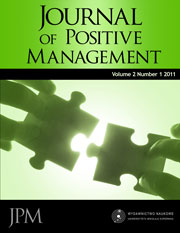Self-assessment of the Positive Potential of Organisation by managers of Polish companies – research results
DOI:
https://doi.org/10.12775/JPM.2010.007Słowa kluczowe
Positive Potential of OrganisationAbstrakt
The article presents the research results obtained by the employees of the Faculty of Economic Sciences and Management research team at Nicolaus Copernicus University of Toruń and the author of the article is its member. The research aims at defining the level of Positive Potential of Organisation (PPO) defined as a set up (condition, level, configuration) of organisations material and non-material resources stimulating Positive Culture and Positive Atmosphere of Organisation, where employees pro-developmental behaviours are shaped, in enterprises operating in Poland. In order to assess the level of PPO, there was a number of surveys conducted, in which representatives of the researched companies were asked to describe the level, at which each component of PPO applies to the organisational potential, by choosing one category in the scale ranging from “definitely does not apply” (0%) to “definitely does apply” (100%). The article contains a detailed characteristics of elementary components of PPO and the interpretation of their ratings, showing the gap between the condition of Polish companies and standard PPO.Bibliografia
Bieniok H. (2004), Metody sprawnego zarządzania, Placet, Warszawa.
Borkowska S. (ed.) (2005), Zarządzanie talentami, IPiSS, Warszawa.
Buckingham M. (2007), Go. Put Your Strengths to Work, Free Press, New York.
Cameron K.S., Dutton J.E., Quinn R.E. (Ed.) (2003), Positive Organizational Scholarship: Foundations of a New Discipline, Berrett-Koehler Publishers, Inc., San Francisco.
Cameron K.S., Positive Leadership. Strategies for Extraordinary Performance, Berrett- Koehler Publishers, Inc., San Francisco.
Eland K., Bailey K. (1999), Obsługa klienta, Oficyna Wydawnicza Read Me, Warszawa.
Glińska-Neweś A. (2010), „Pozytywny Potencjał Organizacji jako prorozwojowa architektura zasobów przedsiębiorstwa”, in: M.J. Stankiewicz (ed.), Pozytywny Potencjał Organizacji. Wstęp do użytecznej teorii zarządzania, TNOiK, Toruń.
Griffin R.W. (1998), Podstawy zarządzania organizacjami, PWN, Warszawa.
Karaszewski R. (2008), Przywództwo w środowisku globalnego biznesu, Wydawnictwo TNOiK, Toruń.
Kożusznik B. (2007), Zachowania człowieka w organizacji, PWE, Warszawa.
Stankiewicz M.J. (Ed.) (2010), Pozytywny Potencjał Organizacji. Wstęp do użytecznej teorii zarządzania, TNOiK, Toruń.
Pobrania
Opublikowane
Jak cytować
Numer
Dział
Licencja
Copyright
Articles submitted to the journal should not have been published before in their current or substantially similar form, or be under consideration for publication with another journal. Authors submitting articles for publication warrant that the work is not an infringement of any existing copyright and will indemnify the publisher against any breach of such warranty. For ease of dissemination and to ensure proper policing of use, papers and contributions become the legal copyright of the publisher unless otherwise agreed.
Plagiarism and ghostwriting
In response to the issue of plagiarism and ghostwriting the editors of the Journal of Positive Management has introduced the following rules to counteract these phenomena:
1. Contributors should be aware of their responsibility for a content of manuscripts.
2. Collective authors are obliged to reveal the contribution and an affiliation of each author (i.e. who is an author of specified part of a paper).
3. Any act of dishonesty will be denounced, the editors will inform appropriate institutions about the situation and give evidence of all cases of misconduct and unethical behaviour.
4. The editors may ask contributors for financial disclosure (i.e. contribution of specified institutions).
Statystyki
Liczba wyświetleń i pobrań: 664
Liczba cytowań: 0



